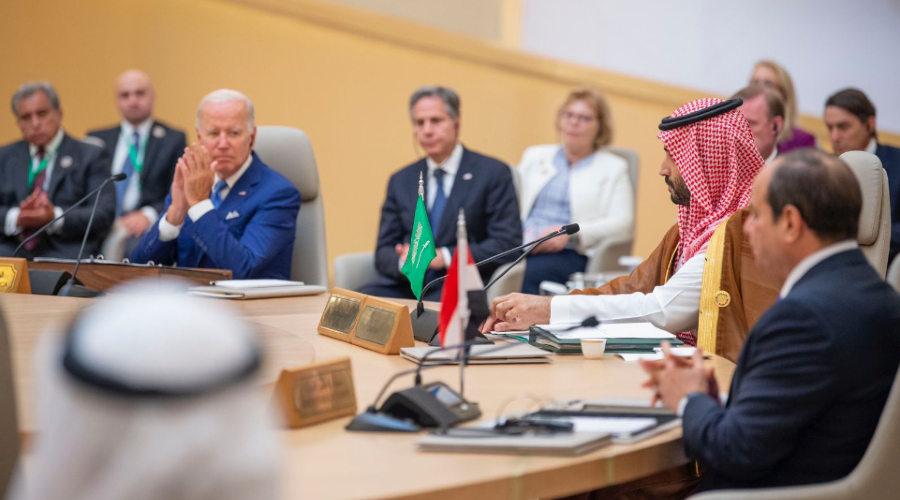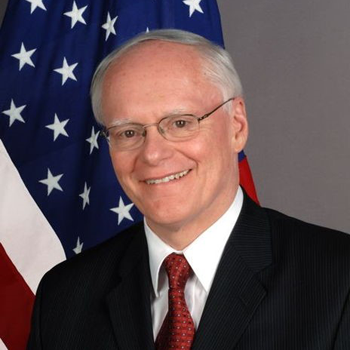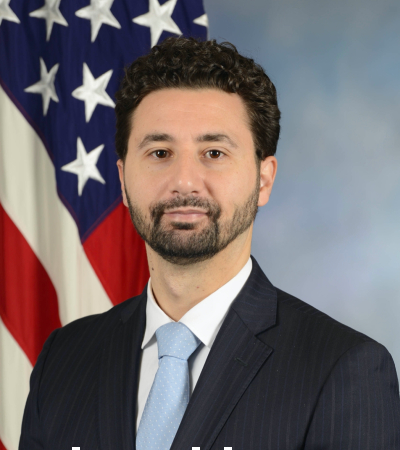How to Overcome the Pitfalls of the Saudi-Iran Dialogue
The talks between the regional rivals have yielded little progress because of the countries' disparate goals and regional positions.

Published by The Lawfare Institute
in Cooperation With

Editor’s Note: The Saudi-Iran dialogue continues, but has produced little progress. As James Jeffrey of the Wilson Center and Bilal Saab of the Middle East Institute argue, part of the reason is that the two powers have fundamentally different objectives for the negotiations and that the power imbalance in Iran’s favor is profound. They suggest ways that Saudi Arabia might improve its bargaining power and argue that the United States can help strengthen Riyadh’s position.
Daniel Byman
***
As British Prime Minister Harold Macmillan wisely said in 1958, “jaw-jaw is better than war-war.” In foreign policy, or in everyday life, talking is better than fighting. But what if jaw-jaw accomplishes little, or worse, potentially backfires?
The direct talks between Saudi Arabia and Iran, two longtime rivals, might seem at first glance to signal another significant shift in the increasingly fluid politics of the Middle East that has followed the 2020 Abraham Accords and U.S. President Joe Biden’s July 2022 visit to the region. These talks—which in principle we support—have largely disappointed. The negligible progress at the negotiating table is rooted in Iran’s and Saudi Arabia’s disparate goals and regional positions.
Talks between rivals tend to fall into two categories: the transformational and the transactional.
Transformational talks are meant to resolve underlying conflicts, either through compromise or force majeure. Germany’s rapprochement with France, culminating in the 1963 Elysée Treaty between German Chancellor Konrad Adenauer and French President Charles de Gaulle, is one such example. Another is the U.S. negotiations with Japan in 1945 after the United States dropped atomic bombs on Hiroshima and Nagasaki, which led to the surrender of Japan.
Transactional talks, by contrast, seek to manage the details of, or gain tactical advantages within, a conflict. An example would be the U.S.-Soviet negotiations on arms control throughout the Cold War. These talks were never expected to lead to a resolution of the underlying ideological conflict, then hardwired into the global system, but rather to make that conflict more predictable, minimize the risk of undesirable “black swan” catastrophes, and avoid misunderstandings.
Both types of talks can be useful. What is crucial, though, is not to confuse one for the other. And that brings us to Saudi Arabia and Iran. Since April 2021, the two sides have held five rounds of negotiations in Baghdad (a sixth was delayed in August due to Iraqi political turbulence), and in that time it seems that the main and perhaps only thing they’ve agreed to is an arrangement that will allow Iran to send thousands of its citizens to the kingdom to participate in the annual hajj pilgrimage. Though the cease-fire in Yemen between Saudi Arabia and the Iran-supported Houthis has been heralded as a breakthrough in the talks, its cause has less to do with positive Iranian intervention and more with the Houthis’ inability to seize the strategically important city of Marib.
The central reason why the Saudi-Iran talks have yielded almost nothing is the vast and multifaceted asymmetry in the negotiations. There seems to be a fatal difference in perspectives over the very nature of the talks and their goals. The two sides have fundamentally different sets of demands and grievances. In the Arab world, this is called hiwar al-torshayn, or the “dialogue of the deaf.”
Having participated in several closed meetings with senior Saudi officials in recent months to discuss regional security issues, we assess that what Riyadh wants from these talks is, at a minimum, a commitment from Tehran to stop attacking the kingdom, either directly like it did in September 2019 when it fired 25 drones and missiles at Saudi oil facilities in Abqaiq and Khurais, or through armed proxies in Yemen and Iraq. Certainly, the Saudis would love to see Iran limit its missile and drone arsenal, abandon its nuclear aspirations, and rein in its militias across the region—in short, curb its quest for regional hegemony—but they understand that these are unrealistic asks. Thus, Riyadh’s approach fits the transactional model.
Saudi Arabia’s core request is based on national security, but Iran’s is not, at least not directly. In our view, Iran is using the talks to accomplish two main goals: First, it is trying to promote stronger diplomatic and economic relations with the Gulf Arab countries, which it desperately needs to help address its dire economic situation—a transactional goal in its own way. Second, it wishes to drive a deeper wedge between Saudi Arabia and the United States by pretending to be a good neighbor that’s committed to dialogue. Creating this impression bolsters the position of policymakers in Washington who argue for further reducing the U.S. military footprint in the Middle East, a longtime objective of the Iranians. This second goal is more strategic and transformational in nature.
Iran may have learned from its 2019 strike against Saudi Arabia that aggression can expose the fault lines in the U.S.-Gulf security partnership and exacerbate tensions between the Americans and the Gulf Arabs—to Riyadh’s shock, Washington didn’t respond directly to the attack. While this might have some advantages, it simultaneously works against one of Tehran’s key foreign policy priorities, which is to limit U.S. combat power in the region. Every time Iran assaults the Saudis or the Emiratis, more U.S. military capabilities are deployed to the region (even if temporarily), more U.S.-led, multilateral security initiatives are created to deter and defend against Iran, and more Arab countries rush to normalize relations with Israel.
These are all outcomes that don’t serve Iran’s long-term interests, which is why we believe that Tehran probably has opted to recalibrate its approach toward the Gulf Arab states. But make no mistake: The radical nature of the Iranian regime suggests that there will always be room for violence and intimidation in its strategy for regional hegemony, but Tehran is now keen to marry that hostility with the façade of diplomacy. That would explain why Iranian diplomats have repeatedly exaggerated the potential of the negotiations and the (negligible) progress that’s been made.
Another constraint of the Saudi-Iran talks is the absence of some kind of strategic parity. The long history of U.S.-Soviet arms control shows that whenever the two sides felt mutually vulnerable but still confident enough about their relative strategic positions and retaliatory military capabilities, they were able to make concessions and reach transactional agreements. But this is not the case with the Saudis and the Iranians. The Saudis fear the Iranians and are the militarily weaker party; the Iranians don’t feel threatened by the Saudis and are the aggressor. This drastic imbalance is a bad foundation for a productive security dialogue.
Creating greater symmetry could make the talks more productive and lead to meaningful outcomes including tangible nonproliferation and arms control measures that would serve regional stability. One way to do this would be to boost U.S.-Saudi security ties. A stronger, not weaker, U.S.-Saudi security partnership could push Iran to negotiate seriously and possibly compromise. The same goes for a more confident Saudi Arabia that feels reassured by a more credible U.S. deterrent in the region. The Biden administration has begun building a stronger bilateral relationship since the president’s trip, but many challenges, largely political and caused by lack of trust, remain. A good place to start would be revising the U.S. approach to military assistance to the kingdom (and Washington’s other Arab partners) so that it focuses less on equipment and more on structural reforms in the Saudi military and defense bureaucracy that will enable it to be more effective and sustainable.
If Washington and Riyadh are successful at rebuilding ties, the next step would be for the Saudis to clarify publicly their regional vision, and then their goals in the Baghdad talks, including how they fit into their goals for the Middle East. States normally detest clear visions as opposed to opaque generalities, but it is time. Saudi Arabia laid out clear priorities with its 2002 Arab Peace Initiative for comprehensive Arab-Israeli peace and could build on that precedent.
Buy-in from at least some Arab League states would be nice, but speed and precision are more important than dozens of signatures—after all, Saudi Arabia is currently the leader of the Arab world. The vision could eschew mention of Iran per se, and instead list Riyadh’s demands for peaceful regional coexistence: credible renunciation of weapons of mass destruction; cessation of heavy armament delivery to militias; a ban on drone, rocket, or missile attacks across borders; condemnation of terrorist groups and attacks; and non-interference in third countries’ political systems.
Everyone in the region will understand immediately whom the Saudis are describing while tactfully not naming names. The Saudis could then make clear to all, including Tehran, that new talks have the purposes of, first, reducing diplomatic misunderstandings that fuel escalation, but also, if Tehran is willing, discussing this Saudi vision, including its application in Yemen, Iraq, Lebanon, Syria, and Gaza.
Further, talks would not advance on Tehran’s agenda items without a balanced consideration of Saudi positions. At a minimum, that will strengthen regional trust in the Saudis regarding the talks and could open the door to Iran recognizing that it will not achieve its goals without reciprocal change in its behavior.





